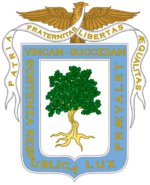Sortenza
Republic of Sortenza Repubblica di Sortenza (Sortenzan) | |
|---|---|
| Motto: Patria, Fraternitas, Libertas, Aequalitas Motherland, Fraternity, Liberty, Equality | |
| Capital and | Trestenna |
| Official languages | Sortenzan |
| Recognised regional languages | Lozaran Dialect |
| Demonym(s) | Sortenzan |
| Government | Federal parliamentary Republic |
| Fiorino Aldini | |
• Premier | Ilaria Bartoletti |
| Legislature | Parliament of Sortenza |
| Establishment | |
• City States Conquered by First Sabarian empire | 312 BCE |
• Grand Duchy of Trestenna | First Century CE |
• City States United under Second Sabarine Empire | 1020 |
• Fourth War of the eagles | 1422 |
• Foundation of the First Sortenzan Republic | 1914 |
• 2nd Great War and Palian Occupation | 1937 |
• Foundation of the Second Sortenzan Reoublic | 1943 |
| Population | |
• 2018 estimate | 17,789,998 |
| GDP (PPP) | estimate |
• Total | $413,000 |
• Per capita | $18,670 |
| GDP (nominal) | 2018 estimate |
• Total | $202 Billion |
• Per capita | $20,890 |
| HDI (2018) | very high |
| Currency | Sortenzan Piastra (PST) |
| Driving side | right |
| Calling code | +619 |
| Internet TLD | .st |
The Republic of Sortenza (Sortenzan: Repubblica di Sortenza) is a sovreign Federal parliamentary Republic located in Western Auressia in Levilion. It lies south of Sabaria and Palia. Sortenza has a population of 17,789,998 and a total area of []km2. The capital and largest city in Sortenza is Trestenna with the most populous regions being around Trestenna and the Palnaro valley as well as the coast in the west. Sortenza is a constituent part of the Occidental Confederacy.
The history of Sortenza has been marked by the influence of conquests from thd south, the influence of the sabarine empire and Apolistic perendism. Sortenza has been civilsed since antiquitywith early settlers thriving due to the rich soil of the Palnaro valkey. Cities such as Trestenna, Capulia and Lozara were founded during this time and underwent the invasion and subsequent annexation if the first Sabarine empire in 312 BCE. The Sabarines brought new wealth and ideals to the land and the people in the Palnaro largely prospered. After the breakup of the First Empire followed invasions from the south in the 6th century which went onto shape modern Sortenzan culture and tradition irrevesably. What followed would be the conquest of the cities of Sortenza by the Second Sabarine empire which later led to the formation of the Grand Duchy of Trestenna after the Wars of the Eagles. The Grand Duchy would expand and form the Kingdom of Sortenza in 1551 and was later goven possesion of colonial holdings such as Amarata. The Kingdom saw rebellion and revolt after the first Great War in which King Rogio IV aligned Sortenza with the Galene league. As the league were the Wars losers Sortenza was stripped of its colonial holdings in Amarata as well as its national pride. Inspired by the earlier Great Upheaval the people proclaimed the First Sortenzan Republic in 1914. This would last until the outbreak of the Second Great War in 1937 when the republic which was attempting to stay neutral was annexed by Palia. Occupation lasted until 1943 after which the current second republic was formed.
The Sortenzan economy is reliant on the services industry and in particular the tourism industry. There are small industrial heartlands in the north west of the country where companies such as FERNA the trademark Sortenzan automobile company manyfacture their models. In comparisson to its neighbours the Sortenzan economy is relatively weak with agriculture in particular still making up a suzeable chunk of the economy. Apolistic perendism is the dominant religion in the country and has helped shape much of Sortenzan society and ideals. Sortenza is known the world over for its stunning landscape, climate, food and culture.


